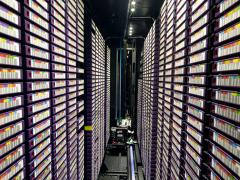2024 brought with it heightened geopolitical tensions, rapid technological advancements and supply chain issues, creating challenges and opportunities for South African CEOs. In this article, Paul Calvey, Oliver Wyman Partner and Head of South Africa, explores the strategies business leaders can use to navigate this complex landscape to achieve sustainable growth in 2025.

Solving pressing business problems while laying the foundation for long-term sustainability has always been the hallmark of successful CEOs and boards. But rising geopolitical tensions, rapid technological advances and evolving consumer demands add more complexity for today’s business leaders.
CEOs face heady challenges, ranging from balancing growth and efficiency objectives, revamping supply chains to managing global risks, and modernising workforce strategies, as a recent report from the Oliver Wyman Forum noted. In the report, which surveyed more than 1,000 CEOs of New York Stock Exchange (NYSE)-listed companies, many of which have interests in the African continent, 55% of CEOs cited organic investment in new revenue streams as a top priority, and an equal percentage emphasised capital efficiency and cash flow management. The report reveals that today's business environment is characterised by a contrasting mix of promise and uncertainty, noting, "Today's CEOs don’t have the wind at their back – they’re travelling directly into it." Consequently, CEOs are prioritising both growth and efficiency.
These economic forces are not unique to NYSE-listed companies. They impact businesses worldwide. Companies that want to come out on top, including those operating in South Africa, need to implement a range of strategies to adapt and focus on long-term growth potential.
Shifting dynamics in South Africa
Before exploring these strategies, it's essential to understand the shifting dynamics within the South African market. Politically, the country is navigating new territory with a government of national unity (GNU) in place for the first time in 30 years. This development has fostered a renewed sense of optimism, particularly as new ministers seek to make a significant impact during their early days in office.
Improvements in the economy further buoy this optimism. After years of severe loadshedding, South Africa is experiencing a sustained increase in energy availability, which is crucial for macroeconomic growth. Looking ahead, the country needs to deliver on its Just Energy Transition (JET) plan, which aims to reduce reliance on fossil fuels and the need for coal-fired power stations. Recent legislative developments, such as President Cyril Ramaphosa signing the Electricity Regulation Amendment Bill into law, are set to foster competition in the energy sector, potentially lowering electricity prices.
Government support has also catalysed significant initiatives in the private sector, particularly among small- and medium-sized enterprises (SMEs). The launch of phase two of the Government Business Partnership exemplifies this effort, aiming to accelerate sustainable, inclusive economic growth and job creation through increased investment and positive sentiment.
From a trade perspective, the potential extension of the US’s African Growth and Opportunity Act (AGOA) offers further cause for optimism. This legislation provides duty-free access to US markets for eligible products from sub-Saharan African countries, which could boost revenue, jobs and overall export activity. Since AGOA's inception in 2000, South Africa has benefited significantly, particularly in the automotive and agricultural sectors. This duty-free access has enabled South African exporters to compete more effectively in the US market, fostering economic growth and job creation.
Additionally, South Africa assumed the Presidency of the G20 from 1 December 2024 – the first time the G20 summit has been held in Africa. This is a unique opportunity to ensure greater focus on the priorities of the global south, while also demonstrating the progress being made and the vast opportunities South Africa holds for foreign investors.
Employing the right strategies
What strategies can South African CEOs adopt to ensure their businesses are resilient and positioned to capture future growth opportunities? One option is to follow the lead of their global counterparts. More than 75% of CEOs surveyed by Oliver Wyman plan to take action over the next two years to address geopolitical instability, protectionism, and industrial policies, with 60% intending to reduce exposure to higher-risk regions.
Given South Africa’s generally neutral standing in global affairs, local CEOs might find opportunities in markets where leaders from larger geopolitical powerhouses hesitate to venture. With geopolitical instability likely to persist, securing supply chains through practices such as supplier vetting, inventory control, and emergency preparedness will be essential. Additionally, companies should adopt more flexible operating models and adjust regional investments based on government incentives or regulations.
There is a precedent for such adaptability. For example, mining companies have diversified their operations across multiple geographies to better withstand individual shocks. Many South African financial services firms have also strengthened their risk management frameworks to mitigate the impact of geopolitical events. Embracing digital transformation has also enhanced their efficiency and resilience.
While digital transformation presents challenges, such as initial investment costs and workforce retraining, the long-term benefits far outweigh these concerns. In the Oliver Wyman Forum report, 96% of CEOs stated that they see AI as an opportunity rather than a risk.
Local CEOs must recognise broader opportunities presented by these rapid technological advancements, and developing digital skills among existing employees and young talent will be crucial. By investing in digital transformation and fostering a skilled workforce, organisations can streamline operations, enhance customer experiences, and improve competitiveness. Furthermore, AI can assist businesses in automating tasks, analysing data, and making informed decisions.
Embracing risk
In economics, the concept of "creative destruction" refers to the process by which innovation drives economic growth by replacing inefficient industries and businesses with more efficient ones. As South African CEOs navigate the complexities of a rapidly changing landscape, they must invest in digital transformation, cultivate a skilled workforce and embrace sustainable practices to position their organisations for long-term growth and success. Additionally, the path to success will hinge on ongoing collaboration between the public and private sectors, fostering a supportive environment for innovation.
In this vital moment, South African CEOs must embrace both the challenges of digital transformation and ethical innovation and also the power of creative destruction. By doing so, they can redefine their industries, enhance their competitiveness and secure a prosperous future for their organisations and, more significantly, the broader economy.














